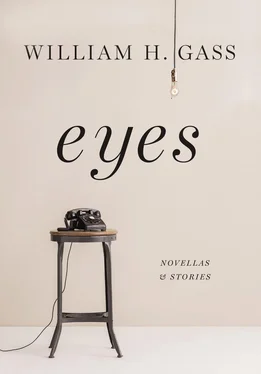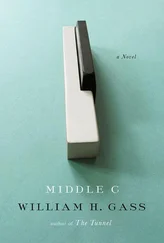The last in line, though he would hate to hear it put in those terms, is Natty Know-it-all, who got his name by being just the opposite, not quite there as to brainy particulars, and slow as faucet drip to learn or find, execute or opine anything. “I’ve half a mind to spin a top,” he’ll sometimes say — ha ha! It does make us laugh a lot cause he couldn’t spin a top if his life depended on it. Just not built for tergiversations. Honest as the day is long though. Honest even all night. All night. The neons have a nervous flash. All Nite they bite air. Honesty’s smaller hours go to those who pass them in their sleep. We have no sex life though we’ve seen plenty of yours, and we are greatful not to have to suffer the same miseries. If we continue to be of use, you will multiply us. Since many languages assign genders to things, we have voted to be pronounced “he,” not “it” or “she,” as if we were ships or fences.
Pleasure produced by frictions of various kinds, rubadubdub-bing, and so forth — I admit — nervous kids have sometimes created it by sliding back and forth, sending pleasant little warmths rhythmically up my struts; and Prince Paul confesses he has enjoyed a few thrills upon opening or folding his legs. I find this hard to believe.
Nights get me. Neons or not. We sit amid our particulars but they are good as gone in the dark that washes through the front window smothering what little light we might have saved up for ourselves during the day and making for a silence that is peculiar to electric things and glass shelves. We die through use — we do — buttons into buttonholes — occasionally there’s a trauma but mostly it is the quiet wear of unnoticed routines — life’s a chair’s hinge — our workaday seats are eaten by squirm and heat. But we also die during nights of inaction and enforced rest, when rust’s slow debilitations pick at what we are and what sustains us with more repetition and determination than the woodworm. Yeah, when we close up shop a lot stops. Of course the sleep of metal has its merits, but I find myself missing the company of our daily things, now that the passage of people has ceased. During business hours we can overhear the shaving gear and the howzitlook mirror carry on a conversation, mostly about hypocrisy or vanity and such sins, or listen to a pair of sinks or trays of tedious utensils rattle on all day while clippers, scissors, toilet sprays yap away or buzz and bicker. Make your little noises, fellows, I let one weary leg say to the others now that silence seems total and only a flicker, reflected from distant headlamps, races across the floor like one of our mice. We’ve been called the seven dwarfs. I don’t know why. People just say things sometimes.
All the barbers have their black vinyl chairs, of course. The headman is always posted near the sidewalk. Perhaps you’ve noticed that barbershops tend to have the same configuration. Their façade is mostly made of window with a door set to one side. That door will have glass in it, too, so a passerby can see the row of us in a line like racehorses at the track, except that we shall face, not a vacant run to freedom, but the big bulbous dental armchairs where the hair is cut; where the beard is shaved; where the nails are filed and buffed; where the shoes are shined and admired. It is hard to like the three bears — that’s what we call the barbers’ chairs — they are so full of themselves and what they can do: “we rise and fall like empires,” the headrest likes to say; “tilt and lift,” the middle chair likes to put it; for the span, that is a leg’s length, the repeated slogan is “lie back and take it easy.”
Barbers used to draw blood and pull teeth. The pole, you know, advertised that. Back when the world had meaning. Leeches were kept in the white ball at the top while the bottom basin collected serum. The moving red helix mimic’d blood’s downward flow, the white one twisted about the pole the way a bandage was wrapped around a leg or arm then, one fresh and clean the other soiled and soaked. But if you walk into such a barbershop in Chinatown you are likely to find an available girl.
By the way, all of us here speak Utile or Toolese, not just we Chairs, but the three bears too, the bottles of shampoo, the push broom and its pan. As far as I know, in this space, I alone — Mr. Middle — speak English, though I never spoke it to the barbers, Fred or Mart or Sam, or Winnie who did nails, or Archie who blacked shoes. I thought it would freak them out. So you will excuse me, I hope, if I make odd mistakes now and then. I rarely get a chance to practice the language. Beside, I’ve had to decide where to put my mouth. Of course, we all communicate by means of vibrations. It is simply that the link between a lamp and a scissor is so much more — may I say? — sophisticated, and more closely resembles your X-rays and ultraviolets and hi-fi. A few animals hear the vowels of Toolese now and then — it causes them to yowl — but humans don’t have any ears for us unless we fall and break, or squeak and shout, or pop and whistle. Even then, you don’t try to understand our exclamations. It’s all right. We’re used to it. Most of us — foot pads, curtains, couches, paper towels — don’t grasp the meaning of your constant chirping and occasional singing any better than any of us does birdcalls and grackle cackle.
I shall be your translator, then, during this brief period of literacy. I am breaking our silence (in your regard) because many of us here in the shop know things about the Sam Bradford affair that you human beings seem unable to understand. After all, we were here the entire time. Yes, a few of us Utes shut down during the row; it was too unpleasant altogether for them; but most of us remained — how do you say it? — mesmerized by events.
But first, let me say something about our general situation. The species I represent originated when primitive man made the first tool. He was looking for assistance from a rock, a fallen limb, a shell, a large leaf. And when that first man found a feather, stripped a stick to make it skinnier, or sharpened a stone, he was making something he hoped would help him out. Our philosophers (once-upon-a-time wine bottles trying to make a living now as vases for single blooms) speak of this as “the materializing of human purpose.” Their celebrated analysis goes this way: the problem, which furnishes the stimulus, must be no small thing to enlist the form from a substance whose life is a continuous struggle. The instrument of solution, which is the tool emerging from the material of its making, must endure the painful lessons of error, trial, and luck. Versions of the tool are applied to the problem until the right nail is eventually smartly struck. The solution is signified by the creature’s pleasure at his success, or his relief at the impediment that has been removed.
As an example, let’s pick on a device that will clean and order human hair and whose need is obvious. The solution: a grid borrowed from a rake or a handful of fingers. This choice suggests that the cave dweller adapted one of the uses of the claw for other purposes — possibilities no doubt discovered when she ran a hand through her hair or undid knots or waited for a waterfall to encourage the tangled strands of her locks to float free.
Humans will have forgotten, but in those days the world and all its filaments were (quite correctly) thought to be alive: to possess a will, have plans, nurse grudges, suffer wounds. A heavy rock was heavy because it was resisting being moved. A hail of water might rush down the arroyo like an angry god. The sea was calm on account of Poseidon. A breeze might grow nervous, and the moon hide itself in a cloud. Thunderbolts were hurled from Mount Olympus at enemies on Etna. So when the toolmaker chipped at his flint, he was releasing certain powers already present in the stone. Right again. If he were smart he would cherish his tools because they were as alive as he. I am speaking proof that the things men have made are inhabited from material furnished by nature and by the energies and intentions of men.
Читать дальше












